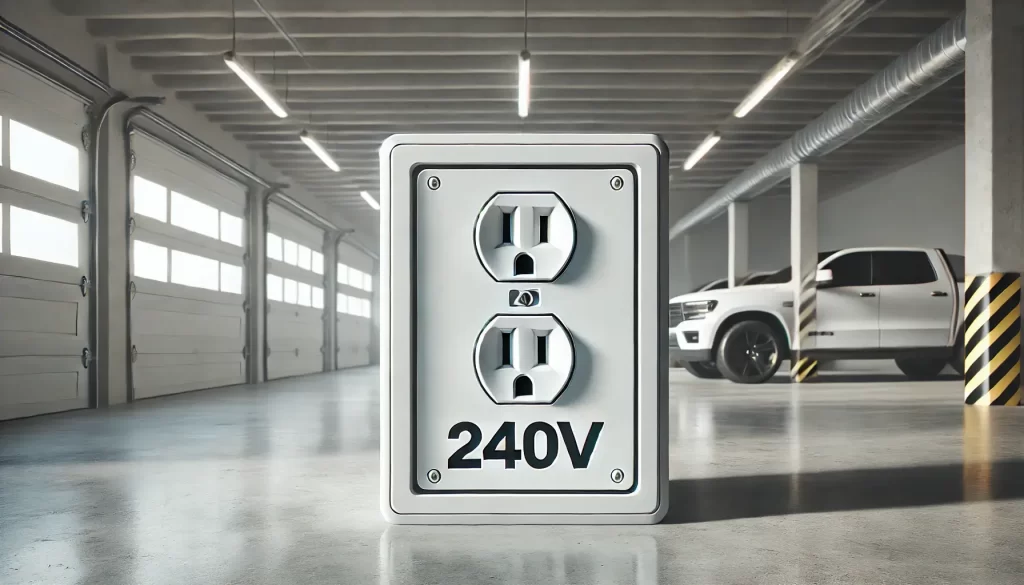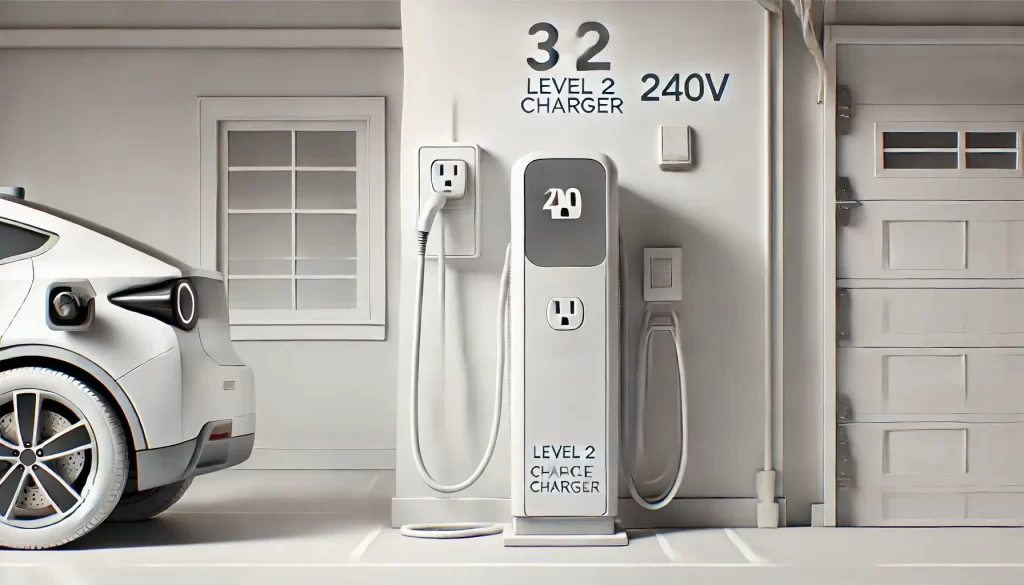No, a Level 2 charger and a 240-volt charger are not the same, although they are closely related. A Level 2 charger typically operates on a 240-volt circuit, but it determines the Level 2 charging speed. While 240 volts refers to the power supply, the Level 2 charger is designed to effectively utilize that power to charge your electric vehicle faster than the standard 120-volt option.
In this article, we will delve into their definitions and how they work together, helping you understand the best charging setup for your electric vehicle.
Table of Contents
ToggleWhat is a Level 2 Charger?

A Level 2 charger is a type of charging device commonly used in home and public charging stations. It provides charging for electric vehicles using 220-240 volts of power, which is faster than the 120-volt chargers (Level 1 chargers) typically used in homes. The current for a Level 2 charger usually ranges from 15 amps to 80 amps, meaning it can charge at a higher power (typically between 3.3kW and 19.2kW).
Level 2 chargers typically require the installation of a dedicated charging station and may require circuit upgrades to ensure that the current and voltage requirements are met. They can provide a higher charging efficiency within a shorter time, usually charging the battery fully within a few hours.
Advantages of Level 2 Chargers
- Faster Charging Speed: Level 2 chargers charge electric vehicles at higher power, typically taking 4 to 8 hours, which is much faster than the 120-volt Level 1 charger.
- Convenience: Suitable for home, business, or public charging stations, offering convenient charging options.
- Compatibility: Most modern electric vehicles support Level 2 charging.
Limitations of Level 2 Chargers
- Installation Cost: Installing a Level 2 charger may require a professional electrician to upgrade the circuit, especially for homeowners.
- Requires 240-Volt Voltage: Level 2 chargers need a 240-volt voltage and cannot be plugged into a standard 120-volt outlet.
What is 240-volt Voltage?

240-volt voltage is the voltage used in power systems for high-power appliances. Compared to the standard household voltage (120 volts), 240 volts can provide more power, making it suitable for devices that require high-power support, such as electric ovens, washing machines, water heaters, etc. In the United States, this voltage is typically supplied by two-phase wires (each wire being 120 volts), which alternate through a transformer to deliver 240 volts. Compared to 120 volts, 240 volts can provide the necessary energy for higher-power appliances, ensuring their proper operation.
Advantages of 240-Volt Voltage
- Suitable for High-Power Appliances: 240-volt voltage can support household appliances that require more power, such as large appliances and electric vehicle charging.
- Provides More Stable Power Output: Due to its higher voltage, 240 volts can more effectively support high-power appliances, avoiding overloads or insufficient power issues.
- Efficient Charging: Electric vehicle Level 2 chargers require 240-volt voltage, enabling faster charging speeds.
Limitations of 240-Volt Voltage
- Installation Requirements: Home users who do not have access to a 240-volt supply may need to modify their electrical circuits or install a dedicated outlet.
- Device Compatibility: It is only suitable for devices that are specifically designed to operate with 240-volt voltage and cannot be used with standard 120-volt outlet devices.
Level 2 Charger vs. 240-Volt Voltage: Their Connection and Differences

Although Level 2 chargers typically use 240-volt voltage, they are not the same. In simple terms, a Level 2 charger relies on 240 volts to provide charging services, but it is not just about the voltage. It is more of a charging standard.
The role of a Level 2 charger is to convert the 240-volt voltage into charging power suitable for an electric vehicle battery, enabling faster charging speeds. You could say that the 240-volt voltage provides the necessary power for the Level 2 charger, but the electrical system and control mechanisms in the charger go beyond just the voltage standard.
1. Technical Differences and Common Misunderstandings
Many people confuse Level 2 chargers and 240-volt voltage, but they are different. A Level 2 charger is a standard for charging equipment, while 240 volts is a measure of voltage. Although Level 2 chargers typically use 240 volts for high-power charging, their design and charging power are determined by several technical factors, including current (amps) and charging protocols, such as J1772 vs CCS.
Additionally, Level 2 chargers often include smart features, such as automatic power shutoff and charging duration control, making them more complex and efficient than a standard 240-volt outlet.
2. Clarifying the Misconception
Many consumers mistakenly believe that a Level 2 charger and 240-volt voltage are the same concept, but this is a common misconception. A Level 2 charger is an equipment standard that requires the use of 240-volt voltage, but its design involves much more than just voltage—it also includes current regulation and charging speed control, among other complex technologies.
Understanding this can help consumers make more informed decisions and avoid confusion when purchasing.
Conclusion
To summarize this article, it’s important to emphasize that Level 2 chargers and 240-volt voltage are not the same concept. A Level 2 charger is a charging standard that relies on 240-volt voltage to provide efficient charging for electric vehicles.
Understanding the distinction between the two can help you make the right choice when selecting these charging devices. By understanding their working principles, advantages, and limitations, vehicle owners can make better decisions about whether to choose a Level 2 charger and how to install and use these charging devices properly.
MOREDAYDC’s EV Charging
MOREDAYDC provides efficient and safe electric vehicle charging solutions, supporting the Level 2 charging standard and using DC fast charging technology to significantly reduce charging time. Their chargers are compatible with multiple electric vehicle brands and come with smart management features, allowing vehicle owners to monitor and control charging in real time via a mobile app.
MOREDAYDC’s equipment is also equipped with multiple safety protection measures to ensure stable and secure charging every time. In addition, MOREDAYDC offers wholesale pricing for EV charging devices. Whether purchasing a single unit or bulk orders, you can contact us for an accurate quote!
Related reading: CCS1 vs. CCS2: What’s the difference?


